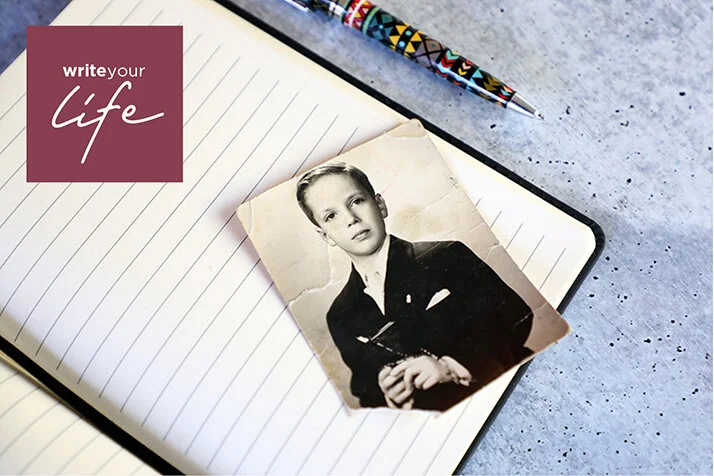4 easy ways to find your way into life story writing
You’ve thought about writing your life story. Perhaps it’s even on your long-term to-do list. But how to go from a theoretical wish for yourself (to get to “someday”) to an actual thing that you do, a practice that you begin and develop (day after actual day)?
Here are a few specific tactics for helping you begin to write about your life’s journey. As I have written about before, don’t let the idea of embarking on a full-blown memoir intimidate you; rather, start by writing your way in, one memory at a time.
1. Diagram your life.
Some people have one burning story to tell. Others find it difficult to immediately pinpoint anything.
Tristine Rainer, author of Your Life as Story, recommends diagramming your life to gain perspective. To do this, get in a retrospective mood, enlist the help of a friend or spouse (martinis also work), and plot your life’s six most significant moments. When you do it thoughtfully and honestly, there will usually be one pivotal event that stands out as particularly intriguing and/or meaningful.
If there isn’t, don’t worry. There are many different ways to diagram a life. Try dividing yours by critical choices, influential people, conflicts, beliefs, lessons, even mistakes. Experiment until you find the one story that wants to be told, the one experience that really fashioned you.
This exercise asks you to focus on formative experiences—a fork in the road or a small decision that ultimately had great impact on your life. If you prefer to start smaller, skip to No. 2.
2. Brainstorm persistent memories.
By persistent memories I mean ones that return to you again and again, often unbidden. Perhaps it’s memories of cooking with your Nana after school that repeatedly return to your consciousness. Or maybe you can’t let go of that one time you lost out on a promotion to a much-younger colleague. If an experience haunts you, it probably holds greater meaning than even you realize—and writing (or even talking) about it will often help plumb those depths.
Lisa Dale Norton refers to a recurring memory such as this as a shimmering image, one “that rises in your consciousness like a photograph pulsing with meaning.”
“These shimmering images are the source of your most potent stories,” she writes. “They have energy; if you squint at them you will see the edges of the image shimmer, wiggle with potential…. This shimmering is the energy of the story that waits inside the image to be told. That’s why you have remembered these images all these years. Over and over they come back, knocking at the door of your creative soul, waiting to shed light on your life, waiting to share the wisdom that resides inside them.”
So go ahead: Grab a piece of paper and jot down those memories that you revisit often. They’re familiar to you, so a simple phrase will likely suffice to jog your memory later (biking in Yellowstone, working at MoMa, that hand-me-down prom dress). When you are ready to write, use this as your own personal cheat sheet of customized writing prompts.
3. Use guided writing prompts.
There are plenty of family history and life review questions available across the web, including some here on my own site. And while I find that they can be powerful guides for life story writing of all kinds, I am here recommending slightly less direct writing prompts to get your memoir writing going.
Rather than walking through the front door, come in through a side window. Rather than doing a brain dump of your experiences from birth till now, hone in on a particular (unexpected) moment. A feeling as opposed to a plot. A peek inside your home instead of a drawing of your house.
Don’t ask yourself, “What was going to college like?” Do, as Beth Kephart prompts in her memoir writing workbook, “Write about leaving. Write with the understanding that you won’t remember all the details, but you will remember how leaving felt.”
Marion Roach Smith encourages us to “think in propinquities.” Don’t write about turkey and stuffing and saying grace on Thanksgiving, for instance. Instead, give us “an angle shot…a sidelong glance at how you learned new ways to be grateful.”
A few “sideways” writing prompts to consider:
Recall a time you felt unheard.
When have you wanted to turn around and go home?
What do you wish a friend would ask you?
Find more such thought-provoking questions in these Q-and-A card decks and in Beth Kephart’s latest workbook, Journey: A Traveler’s Notes. And discover some of my own favorite life story vignette writing prompts that use your senses to help get the writing flowing.
4. Revisit the past.
Forget about writing. Instead, talk about your memories. Walk down memory lane with a loved one, gather with siblings to reminisce about your childhoods, interview an older relative, or hit “record” on your smart phone during a family reunion or holiday gathering.
The mere act of letting your mind wander back in time will bring memories to the surface and make them accessible when you sit down to write. Also consider jotting down notes while you are chatting with family, or using a voice recorder and an auto-transcription app to generate pages to use during your writing later.
Other ways to revisit the past for inspiration? Read your old journals (even—maybe especially—if they make you cringe!). Pull out some old family photos to jog your memory (check out this free download full of tips if this approach appeals to you.) And, my favorite, go for a walk in nature: As Henry David Thoreau wrote in his journal, “Methinks that the moment my legs begin to move, my thoughts begin to flow.”
Memory & writing prompts sent weekly to your phone
Short courses for anyone who wants to write about their life—just $15 for 8 weeks of guidance & inspiration!
















You start out with excitement and fervor—blank pages are feverishly filled with stories about your life. But what can you do when your memoir momentum wanes?